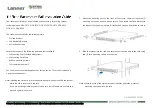
Network interface specific configuration
The interface specific parameters can be found in the Interface section. If your
LANTIME is equipped with only one network interface, you will find only one sub
section (Interface 0). Otherwise you see a sub section for each installed Ethernet port.
Here, the parameters for the network port can be changed. In the upper section of the
page you can enter the IPv4 parameters, the lower part gives you access to the IPv6
parameters of the interface.
IPv4 addresses and DHCP
IPv4 addresses are built of 32 bits, which are grouped in four octets, each
containing 8 bits. You can specify an IP address in this mask by entering four decimal
numbers, separated by a point “.”.
Example: 192.168.10.2
Additionally you can specify the IPv4 netmask and your default gateway address.
Please contact your network administrator, who can provide you with the settings
suitable for your specific network.
If there is a DHCP (Dynamic Host Configuration Protocol) server available in your
network, the LANTIME system can obtain its IPv4 settings automatically from this
server. If you want to use this feature (again, you should ask your network
administrator whether this is applicable in your network), you can change the DHCP
Client parameter to “ENABLED”. In order to activate the DHCP client functionality,
you can also enter the IP address “000.000.000.000” in the LCD menu by using the
front panel buttons of the LANTIME. Using DHCP is the default factory setting.
The MAC address of your timeserver can be read in the LCD menu by pressing the
NEXT button on the front panel twice. This value is often needed by the network
administrator when setting up the DHCP parameters for your LANTIME at the
DHCP server.
If the DHCP client has been activated, the automatically obtained parameters are
shown in the appropriate fields (IPv4 address, netmask, gateway).
IPv6 addresses and autoconf
You can specify up to three IPv6 addresses for your LANTIME timeserver.
Additionally you can switch off the IPv6 autoconf feature. IPv6 addresses are 128 bits
in length and written as a chain of 16bit numbers in hexadecimal notation, separated
with colons. A sequence of zeros can be substituted with “::” once.
49
Summary of Contents for LANTIME
Page 1: ...Technical Information Operating Instructions LANTIME SHSPZF ETX BGT...
Page 47: ...Configuration Ethernet 47...
Page 52: ...Configuration Notification 52...
Page 56: ...Configuration Security 56...
Page 69: ...Configuration Local 69...
Page 77: ...Configuration Statistics 77...
Page 110: ...Rear View LANTIME 110...
Page 111: ...SUB D Connector Assignments 111...
Page 113: ...Accuracy of frequency TCXO quartz standard 113...
Page 132: ...Menu Quick Reference 132...
Page 145: ...IRIG Standard Format 145...
Page 146: ...AFNOR Standard Format 146...
















































